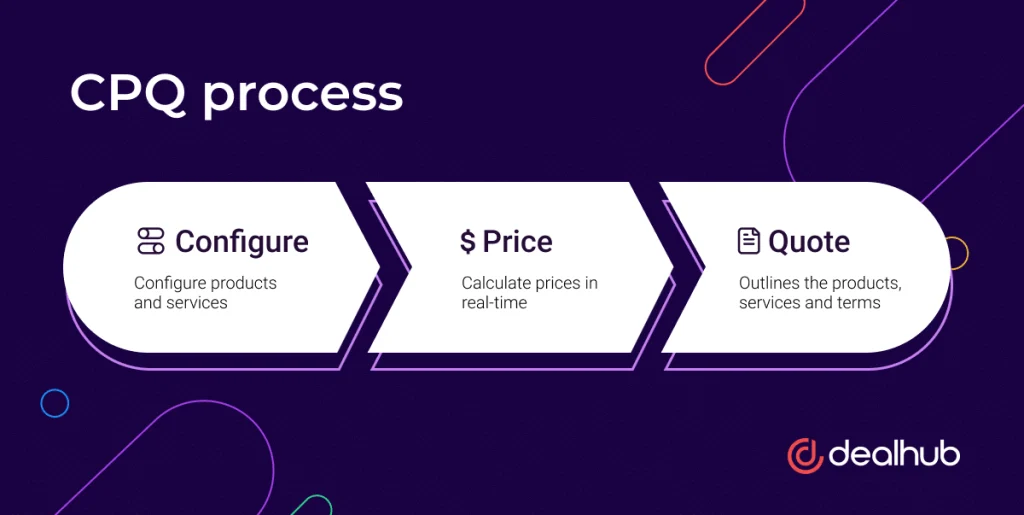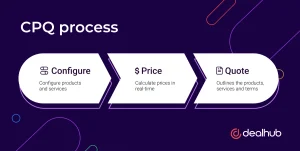What is CPQ?
Definition of CPQ, and how does it benefit sales organizations?
CPQ stands for Configure Price Quote, which is the process salespeople follow when configuring products, determining the price of the products, and producing a quote. The CPQ process simplifies the quoting process for configurable products and is an integral part of the quote-to-cash process.
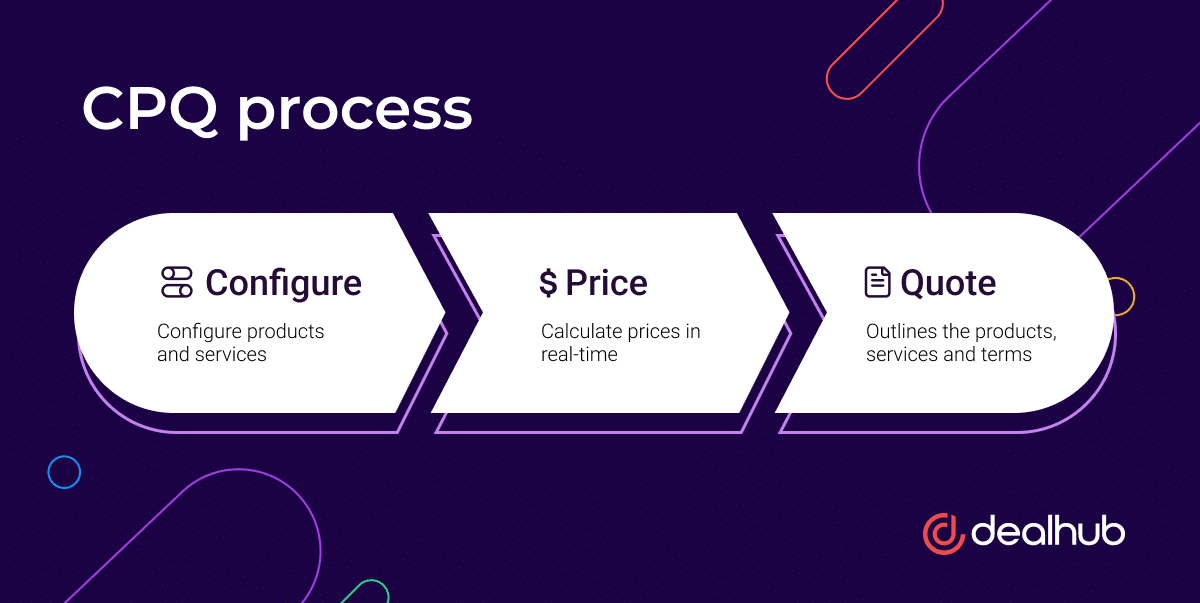
Let’s break down each of the components of CPQ:
Configure
CPQ enables sales reps to easily configure products and services according to customers’ needs by accurately capturing what features or components are desired in the product. It also allows companies to specify what customization options are available for each component, what components must be bundled together, what features can or cannot be combined, what components must have complementary items, what accessories go with specific components, and what options need additional customization. This way, customers can get exactly what they need without manually entering specifications and configuration details into a quote form or CRM system.
CPQ integrates with other existing software such as ERP, CRM, accounting systems, or eCommerce platforms to ensure product data accuracy at the time of the quote.
Price
CPQ solutions allow sales reps to calculate prices in real-time based on the configured product’s specs. The pricing component of CPQ involves setting base prices for certain components or features of a product as well as discounts and markups for specific customer segments or product options. For example, companies might offer discounts for bulk orders or add markups to particular features that customers prefer over other options. Other factors influencing price include delivery charges, taxes, discounts from suppliers, or special promotions such as buy one get one free offers.
An advantage of CPQ is the ability to set up pricing rules based on a company’s business model. The software automates price determinations for complex pricing models such as tiered pricing, subscription pricing, volume pricing, and bundled pricing. This eliminates the need for pricing spreadsheets and manual pricing calculations, and ensures quotes are always accurate.
CPQ software also allows companies to quickly update their pricing models by changing parameters such as discount amounts or applying new markups. This ensures that companies can keep up with changes in the market and adjust their prices accordingly without manually adjusting every product price each time there’s a change in market conditions.
Quote
A quote in CPQ is a branded document that outlines the products and services included in the sale, their prices, and any potential discounts or special offers. It also includes the terms and conditions of the sale and the accepted payment methods. It is important because it provides an exact record of what was agreed upon between the buyer and seller so that there are no misunderstandings later on.
CPQ software helps streamline the process of creating a quote by allowing users to configure products to meet a customer’s needs quickly, automatically apply discounts and specials as needed, include all necessary terms and conditions, and package everything into a single document for easy review. This removes much of the manual effort to create quotes while ensuring accuracy.
Because quotes created with CPQ software can be generated almost instantly, they can play an important role in speeding up negotiations and closing deals faster. Furthermore, ensuring accuracy throughout the quoting process reduces errors that could potentially lead to expensive mistakes down the line.
https://youtube.com/watch?v=T5nokZHxyvM%3Ffeature%3Doembed%26enablejsapi%3D1%26origin%3Dhttps%3A
Synonyms
- Configure price quote
- Configure-price-quote
- Configure, price, quote
What is CPQ Software?
CPQ software helps businesses manage the complex pricing of their products and services. This technology helps sales organizations configure product offerings, set up pricing rules and discounts, and generate error-free quotes and professional proposals customized to buyers’ needs.
This type of software is often used by companies that sell customized or made-to-order products, as it can help simplify the quoting and pricing process. CPQ software can also be used to streamline order management and help ensure accuracy and compliance with pricing rules. When configuring products and services, CPQ software provides users with a graphical interface that allows them to easily select the options and variations they desire. The CPQ software then calculates the appropriate pricing based on the options selected. This can help save time and reduce errors when creating quotes and orders.
CPQ software can also help manage discounts and promotions, as well as create pricing reports. This type of software can be used by businesses of all sizes, but is often essential for companies that sell complex products or services. CPQ software can help make the quoting and ordering process more efficient and accurate, leading to happier customers and increased sales.
CPQ streamlines the sales process, reduces administrative tasks, and ensures the delivery of accurate quotes to buyers, which enhances the customer experience. Some advanced CPQ software solutions also track buyer engagement with the quote, monitor deal progress, and provide analytics on the sales process.

Configure
Configuration ensures that products are available, meet buyer specs, and arrive within accepted terms.

Price
Price management allows sales people to choose between product options, packages, and services, and offer approved discounts.

Quote
The quote generation process ensures that all collateral included in the quote is legal, on-brand, and compliant.
CPQ Functionality
What does CPQ allow organizations to do?
The key functionality of CPQ is the ability to configure the right products to sell to your customer, whether you offer simple or very complex products. CPQ software solutions automate the quote generation process, taking into account product dependencies, pricing models, and discount policies. Professional proposals are then generated to send to the prospective customer.
Configure Price Quote software encompasses a range of solutions: from very simple tools that allow salespeople to enter a product, select a discount, and generate a quote, to the other extreme which integrates with ERP systems such as shipping and inventory.
Using CPQ software simplifies selling and improves sales efficiency by guiding sales reps through the quote process using a sales playbook. The Sales Playbook tool within the CPQ guides selling workflows to keep deals focused on buyer needs and drive deals forward. Sales reps can select the right configurations for each customer to ensure pricing consistency, error-free quoting, and faster approvals.
A product rules CPQ template that simplifies multiple SKU variations into a guided question and answer process eliminates complexities and produces quotes that are easy for buyers to understand. Cross and upsell advice is built into the workflow, offering relevant, rules-based sales recommendations, so deals can be tailored to each buyer’s needs.
A CPQ with guided selling enables sales reps to create automatic pricing quotes complete with visual product comparisons, online visual aids, and audit trails. Sales managers can track all changes and actions taken as they happen.
Instant, high-quality professional quotes enable sales teams to expedite the quoting process, typically reducing it from days and weeks to minutes and hours. Sales reps and channel partner reps will be quoting like pros – with minimal training – and the personalized quote templates will help sales organizations maintain a standardized, professional company message.
Quote Approvals
How does CPQ ensure pricing quotes are validated and approved?
CPQ solutions also address the issues of valid product configurations, pricing consistency, and quote approvals. Integrated approval workflows ensure key stakeholders are in the loop on quotes before they’re sent, which is crucial when special pricing or customized product offerings are involved. Once approved, CPQ solutions can also make sure sales quotes can’t be changed, whether by accident or intent after they’ve received approval. Sales reps can be certain that quotes sent to customers are fully validated and orders based on these quotes will not be rejected.
Benefits of CPQ
How does a CPQ solution positively impact Sales Operations?
In 2013, Aberdeen Group surveyed 159 organizations to determine the sales processes and technologies that the top-performing organizations used to close deals. They learned that optimizing sales workflows with a CPQ solution provides tremendous efficiencies and advantages over manual processes. The benefits of using this sales tool during the quote-to-cash process to send quotes to customers are:
More Accurate Quotes
With CPQ software, you can be confident that the quotes you’re sending to your customers are accurate. This is because CPQ software takes into account all of the necessary data points, such as product configuration rules, pricing, product availability, and discounts.
Increased Lead Conversion Rate
Prospects don’t want to have to chase after the salesperson while they’re waiting for a bid. Prospects expect to be able to move the buying process forward without delay. Custom quotations may be generated in minutes using a CPQ solution, significantly increasing the likelihood of qualifying the lead by 21 times!
Increased Quote Generation
In the past, generating a quote could take days or even weeks. With CPQ software, you can generate a quote in minutes. This means you can close deals faster and improve your customer experience.
Shortened Sales Cycle
CPQ software can reduce the length of the sales cycle by making it easier to generate quotes and close deals. With accurate quotes and faster turnaround times, you’ll be able to win more business.
Increased Deal Size
Automated pricing mechanisms protect profit margins and limit rogue discounting. Discounts that fall under a fixed threshold can be triggered to be automatically approved, while discounts above that threshold can be routed to the appropriate approver. In addition, CPQ software guides sales reps through upsells and cross-sells to ensure buyers are presented with the best possible deal, which increases the deal size in many cases.
CPQ for Industries
CPQ software can be used in a number of industries but is especially beneficial for companies that sell complex products or services. It is most commonly used in the manufacturing, software, and IT industries. In the manufacturing industry, CPQ can help companies manage large numbers of product configurations. In software and IT, CPQ can help companies manage large numbers of software licenses, subscription models, and product configurations. CPQ helps companies in the following industries grow revenue.
- Software & IT
- Computer & Networking Security
- Manufacturing
- Finance
- Telecommunications
- Food and Beverage
- Health
- Logistics and Supply Chain
- Marketing and Advertising
- eLearning
- Human Resources
- Business Services
- Waste Management
CRM with CPQ Integration
How does CPQ complement CRM?
Using a CRM has become standard practice among organizations of all sizes to keep customer information organized and track sales opportunities. But, integrating a CPQ tool with a CRM helps organizations become more efficient and streamlines the sales process.
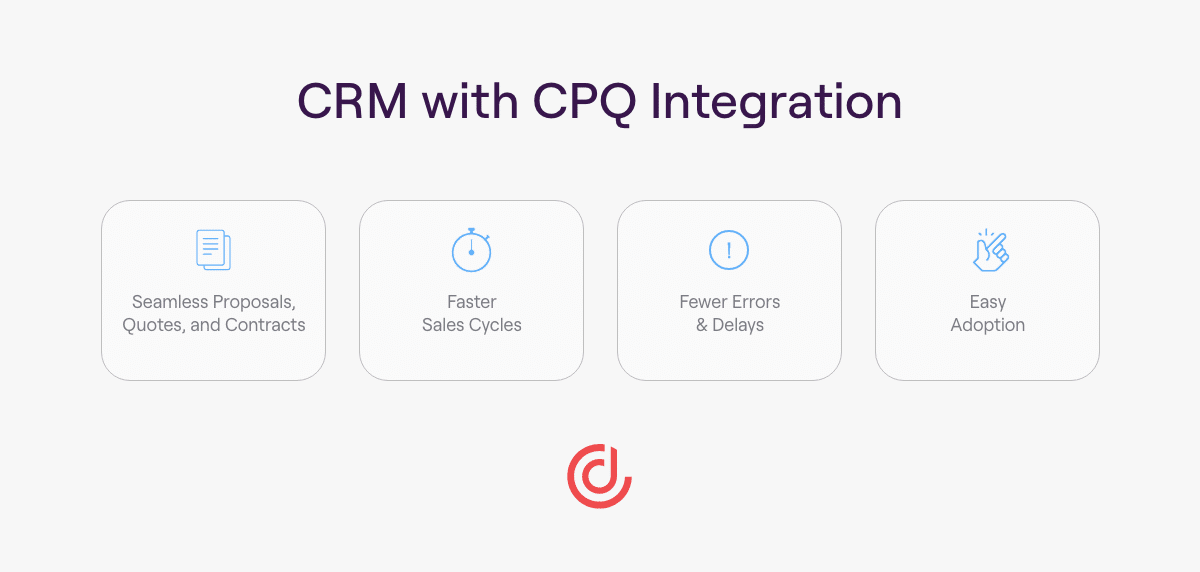
Seamless Proposals, Quotes, and Contracts
Many sales teams use optimal CRM solutions like Salesforce, Microsoft Dynamics, SugarCRM, HubSpot, and Freshworks, to assess leads and follow up with them, but then use stand-alone tools for things like sales quoting, price optimization, proposal generation, contract management, and playbooks.
Instead of having to use Microsoft Excel and Word for these sales solutions, a CPQ can turn them into a seamless part of the sales process.
CPQ essentially does the same thing as a CRM, just for different elements within the sales cycle. With a CPQ integrated natively within the CRM, sales reps can communicate with potential customers and send proposals in record time. When all sales processes are connected, the sales cycle never becomes bottlenecked, which increases the likelihood of a successful deal.
Faster Sales Cycles
Studies show that companies that use CPQ solutions enjoy faster sales cycles. Reps can generate complex quotes promptly, respond rapidly to proposal requests, and avoid “indecision” sales losses.
A streamlined workflow results in faster quotes. A CPQ combined with the power of efficient CRM solutions makes a rep’s job much easier and reduces sales cycle time.
Fewer Errors & Delays
When reps are using CRM solutions and disconnected sales tools, the chance of errors occurring increases exponentially. Reps tend to waste time searching for pricing policies and sales materials because they aren’t part of the workflow.
Manual price quoting is inherently error-prone. When reps have to search through Excel sheets, price lists, and product documents to configure a quote, mistakes are bound to happen.
When the CPQ process is integrated with CRM solutions, everything meshes. Prices are updated in real-time, and the CPQ acts as a single source of truth about products, inventory levels, pricing, and discounting rules. Quote generation is part of a workflow that reduces errors and allows reps to create accurate price quotes and proposals and include supporting content assets with ease.
This impresses prospects, wows customers, and makes it more likely that reps will get an emphatic “yes” when it comes time to close the deal.
Easy Adoption
An often-overlooked benefit of CRM-CPQ integration is that it eases user adoption. There’s little to no learning curve when integrating a CPQ with the CRM platform sales teams already use. The CPQ process becomes part of the sales workflow. Even new reps with little experience will easily learn how to CPQ and will quickly realize that it makes their job easier and helps them close deals faster.
When justifying the need for CPQ, consider the needs of the organization, the sales operations department, the sales team, and customers.
CPQ Justification
Does your sales organization need Configure-Price-Quote software?
There are many reasons why organizations need to implement CPQ. Among them are:
- Sales process inefficiencies
- Burdensome administrative tasks
- Complex product configurations
- Inaccurate sales quotes
- Frequent rework of quotes
- Rogue discounting
- Quotes sent without approvals
- Poor response time to customers’ requests for quotes
- Missed upsell and cross-sell opportunities
- Missed renewals
- Poor customer buying experience and low satisfaction with the sales process
When justifying the need for CPQ, consider the needs of the organization, the sales operations department, the sales team, and customers.
Sales Operations needs CPQ to ensure sales productivity and efficiency in the sales process, including quote and proposal generation, as well as sales rep training.
A CPQ ensures that each step in the sales process is carried out according to a standard playbook and that pricing and configurations are accurate.
Team members always have updated accurate pricing and discounting built into the software, so the quote generation process is error-free.
Organizations need CPQ for pricing standardization, quote accuracy, and corporate branding. CPQ enables sales teams to represent the company in a standardized manner in pricing, messaging, and the look and branding of the proposal. CPQ shortens the sales cycle by ensuring sales reps respond quickly to customers, produce quotes fast, and generate proposals that get noticed by decision-makers.
CPQ solutions include tracking and analytics to measure customer response to quotes and determine where quotes are stuck in the sales pipeline. Analyzing the value of quotes and the acceptance and rejection of deals helps improve revenue operations.
Further reading: 13 CPQ Features that Matter Most to Sales Operations Leaders
CPQ benefits sales teams by reducing the amount of time they spend on non-sales activities. A CPQ helps them respond faster to their customers with the right pricing, messaging, and marketing documentation while eliminating time-consuming administrative tasks.
CPQ ultimately benefits customers when they receive a quick response to their requests for quotes. They enjoy greater satisfaction with the sales process, and a greater sense of trust as well. Quotes are accurate and have gone through an approval workflow before being sent to the customer. Proposals include personalized content to help customers make sound business decisions. These factors are essential to a customer-centric sales process.
Further Reading: Why Your CRM Needs a CPQ Integration
Sales Operations Efficiencies
How does CPQ help sales organizations achieve their goals?
CPQ streamlines the sales process, which increases the efficiency and productivity of sales teams. Guided selling reduces new hire training time, decreasing time to value. When sales reps spend less time on administrative tasks and follow an intuitive workflow, they have more time to focus on building relationships with customers and selling.
Take a look at the positive impact of CPQ on Sales Operations:
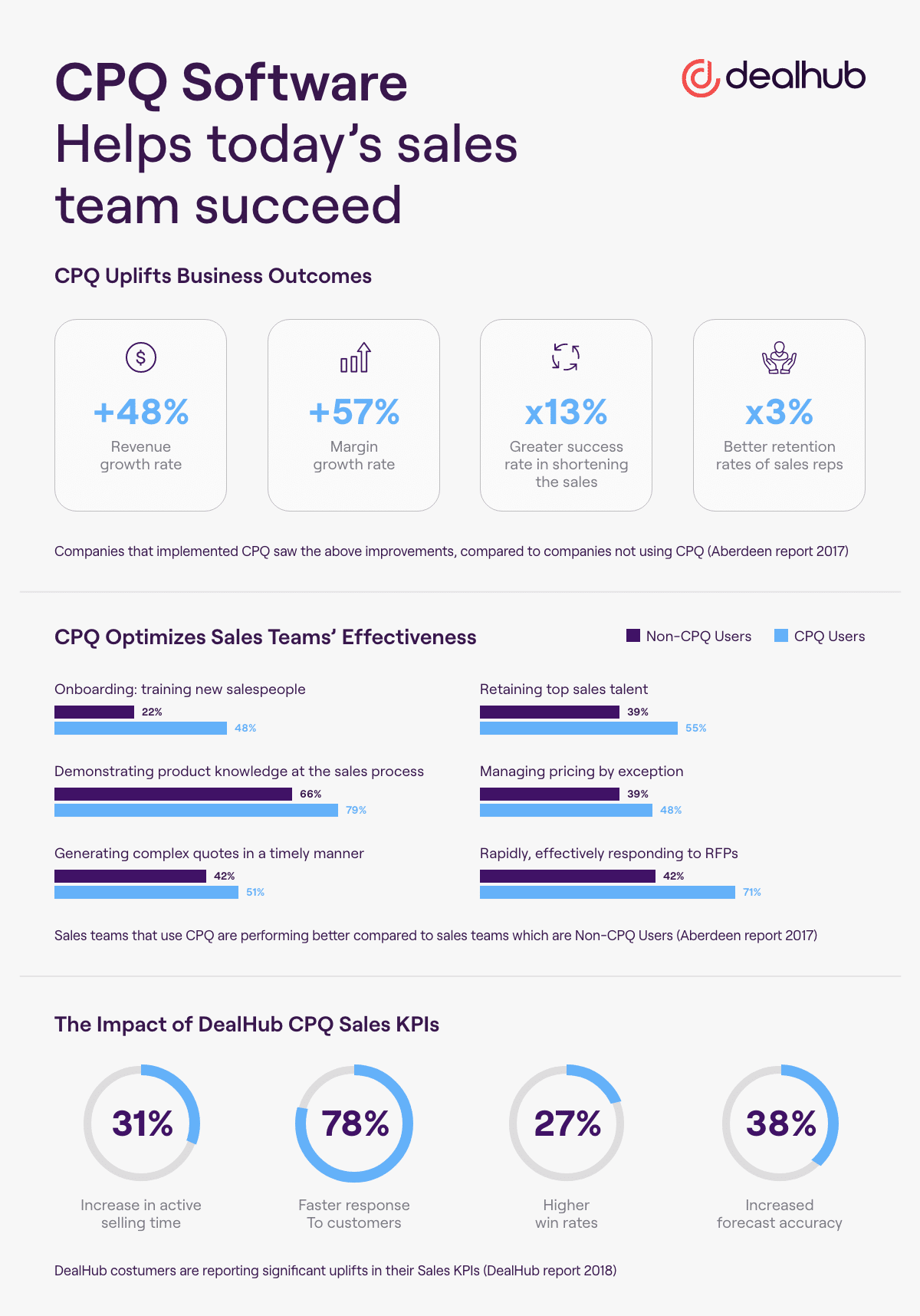
CPQ Integration
When is the right time for CPQ?
There are preconceptions about the right time for organizations to consider CPQ. Organizations don’t need a certain number of salespeople before looking at CPQ or very complex pricing or configurations to see the value from a CPQ solution. There are more relevant factors to consider when determining the right time to implement CPQ.
Consider these questions:
How much time are your salespeople spending on generating quotes?
Is the size of your sales team increasing?
How fast are you able to get back to your customers?
Is generating quotes a tedious process that requires sales reps to pull information from several sources?
Are quotes going into your CRM, and is everyone using the same playbook?
What are the costs of errors from incorrect configurations or incorrect pricing?
“DealHub gives us excellent value for the money. The platform is very agile and easy to configure.”

Yuval Zilberman,
Global Director of IT,
AVT
Compliance Challenges for CPQ
Financial data stored in your CPQ is governed by regulations that protect shareholders. Below we discuss the measures you can take to comply with these regulations.
SOX Compliance
SOX, also known as the Sarbanes-Oxley Act of 2002 or Corporate and Auditing Accountability, Responsibility, and Transparency Act, was passed to improve corporate governance and protect shareholders from fraudulent activities by company executives.
SOX compliance refers to the process of ensuring that a company is in compliance with the provisions of the act. This includes preparing financial statements that accurately reflect the company’s financial position and disclosing any material information that could potentially impact investors’ decision-making.
In order for a CPQ system to comply with SOX, companies must put into place internal controls and procedures to ensure the accuracy and completeness of their financial reporting. CPQ solutions store data about pricing, discounts, and other such information. When monitoring compliance, auditors will want to see that a price change, for example, was authorized, tracked, and properly delegated. You will be out of compliance if you can’t demonstrate that it was.
Protecting CPQ Rules
A CPQ must have security features that protect the CPQ rules so that only authorized users can access and modify them. There are two main ways to do this: by protecting the rule itself and by protecting the data used by the rule.
To protect the rule itself, the CPQ needs to have built-in security features, such as profiles and permission sets. For example, you can create a profile or permission set that only allows users to view CPQ rules. To protect the data used by the rule, you can use security features, for example, that only allow users to see data that is relevant to their job function.
Protecting Products with an Agent
Protecting products with an agent is a great way to keep your product catalog safe and secure in your CPQ. It ensures that only authorized users can make changes to your products. An agent can help you manage pricing, discounts, and other product details.
When you add a new product to your catalog, most CPQ software will allow you to specify whether or not you want to protect the product with an agent. You’ll need to specify the agent’s email address. The agent will then receive an email notification any time someone attempts to modify a product.
Custom Policies
Your CPQ solution should allow you to create custom policies that can be used to automate pricing and approval processes. Custom policies can be created using a point-and-click interface, and they can be triggered by events such as quote submission or line item changes.
Custom policies can automatically calculate prices based on certain criteria or send quotes for approval based on predefined rules. Custom policies can also be used to create discounts or bundles, and to manage approvals for quote changes. Creating custom policies in CPQ is a simple process that can be completed by anyone with basic knowledge of their CPQ platform. However, it is important to note that custom policies should be tested thoroughly before being deployed to a production environment.
Customizing Your CPQ
Most CPQ solutions have “out of the box” features that enable sales teams to generate quotes with basic tool configurations such as product lists and pricing. However, most organizations need some degree of customization of their CPQ for things like:
- document configuration
- complex pricing models
- product customization
- approvals processes
- subscription management and renewals
- contract redlining
- discounts and exceptions
Without an in-house CPQ expert or software consultant, it is difficult for many sales operations leaders to administer their CPQ if it is not an agile solution. When searching for a CPQ vendor, it is essential to look for one that is easy to customize. An easily customizable, no-code, agile CPQ is the modern solution for sales teams. Customizable CPQ software typically includes product catalogs, pricing rules, and product configurators that are easy to change to meet the organization’s specifications and workflows. Allowing sales administrators to set up custom logic on some CPQ components without requiring heavy code makes an agile CPQ easier to set up and maintain. In addition, a no-code CPQ enables sales admins to easily update pricing, products, and discounts without needing IT assistance.
CPQ Selection Process
How to find the right CPQ for your needs
CPQ is cross-organizational, so consider the needs of the different groups within the organization, including Sales Management and Operations, Finance, and Legal.
Determine what Sales Management and Sales Operations are trying to achieve. List the pains they are experiencing and the features that a CPQ solution must have to address those issues.
Sales Management and Operations will be concerned with issues such as:
- Price quote control
- Version control
- Quotes synced with CRM
- Standardizing product configuration rules
- Advanced approvals
- Margin approval accuracy
- Sales process standardization
- Improved buyer experience
- Sales rep administrative tasks vs. active selling time
- Reduction in error rates and inaccuracies
- Response time to requests for quotes
What needs do Finance and Legal have that the CPQ solution will address? Consider how a lack of standardized pricing, advanced configurations, inconsistent discounting, and non-compliant contracts may be causing issues within your current sales processes. The CPQ should be able to solve those problems so every sales quote that is sent to buyers is accurate and compliant.
Further reading: 15 Tips for Choosing the Right CPQ Software
How to Select a CPQ Vendor
How to Create CPQ Requirements Documentation
Why is it Important to Evaluate a CPQ Vendor?
“We selected DealHub because of the people, product, and process… It’s really fast to get to value. It’s one of the easiest integrations we’ve had to do.”
Rebecca Crum,
Director of Alliances Program Manager,
Lastline
Using CPQ Software to Evolve Your Sales Operations
The great engineer and management consultant W. Edwards Deming said, “Eighty-five percent of the reasons for failure are deficiencies in the systems and process rather than the employee. The role of management is to change the process rather than badgering individuals to do better.” Utilizing a best-in-class CPQ, integrated with a CRM, allows sales operations to change their processes and achieve better results for their organization, their team, and their customers.
Aberdeen reported that by using a CPQ, best-in-class sales teams were better able to realize efficiencies in the following areas:
- Minimizing the number of people, functions, etc, required to develop and deliver quotes to buyers
- Managing by exception with pricing/discounting “guardrails” in place
- Generating complex quotes in a timely manner
- Providing sellers with marketing tools to develop, send, and track response to messaging (Source: HubSpot and Aberdeen Group Report)
When choosing a CPQ platform for your organization, look for CPQ vendors that perform well in these areas. These guidelines will help you find a CPQ that will make a positive impact and help you meet your sales operations goals.DealHub CPQ Integration with Your CRMMake DealHub CPQ Part of Your Sales Process
CPQ Podcast
CPQ has transformed the sales process for buyers and sellers. As the new wave of CPQ technology has emerged in recent years, so has CPQ’s profile been elevated in revenue operations’ news and media. Two recent RevAmp podcast episodes highlighted how CPQ helps create a frictionless buying experience.
Microsoft Dynamics CRM + DealHub CPQ = A Frictionless Buying Process
In this episode of the RevAmp podcast, Mike Dickerson, CEO of ClickDimensions, discusses the importance of a buyer-centric sales process and how CPQ helps sales teams close deals by enabling real-time collaboration between all deal stakeholders.
DealHub CPQ and DealRoom enable multiple approvers to access the quote and sales proposal wherever they come into the buying process. This reduces friction, especially for remote sales teams and buyers who need to be able to quickly find the digital information they need to make a decision.
How CPQ Software Has Transformed B2B Sales
Frank Sohn joined the RevAmp podcast to share his insights on how CPQ has transformed selling and the customer experience. With 25+ years of experience in the CPQ industry, Frank has witnessed the evolution of CPQ from “product configurators” used primarily in manufacturing to the integrated configure-price-quote solutions used across industries today.
Now, CPQ can handle more complex product configurations, and the UI and UX have completely changed, making it easier for salespeople to use the software. The move toward subscription-based pricing has ushered in another exciting development in CPQ, the ability to integrate CPQ with billing solutions.
